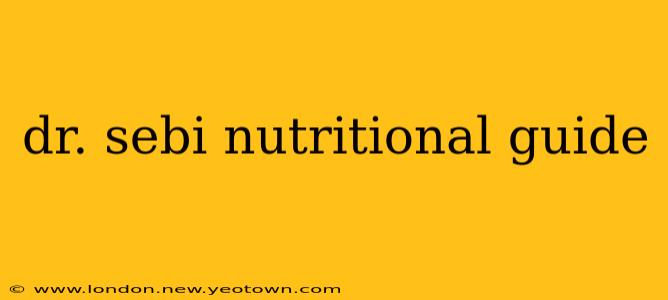Dr. Sebi, a controversial yet influential figure in the world of alternative medicine, championed a unique approach to nutrition centered around an alkaline vegan diet. His philosophy, though not scientifically validated in the same way as conventional medicine, has gained a dedicated following. This guide explores the core principles of Dr. Sebi's nutritional plan, addressing common questions and offering insights into its potential benefits and drawbacks. It's crucial to understand that this is not a replacement for medical advice, and consulting a healthcare professional before making significant dietary changes is essential.
What is Dr. Sebi's Diet?
At its heart, Dr. Sebi's diet is a strict alkaline vegan regimen. It emphasizes consuming plant-based foods believed to alkalize the body, while strictly avoiding acidic foods. This philosophy rests on the belief that many illnesses stem from an overly acidic internal environment. The diet focuses on nutrient-dense, whole foods, minimizing processed items and refined sugars. It's important to note that the scientific community doesn't fully support the claim that diet directly impacts blood pH in a significant way. However, the focus on fruits, vegetables, and other whole foods aligns with many accepted healthy eating guidelines.
What Foods Are Allowed on Dr. Sebi's Diet?
The approved foods list is extensive but centers on specific fruits, vegetables, and herbs. Think vibrant colors! Expect plenty of:
- Fruits: Many tropical fruits are favored, including papaya, mango, and pineapple. Berries and other fruits rich in antioxidants are also encouraged.
- Vegetables: Leafy greens, root vegetables, and other colorful vegetables form the backbone of the diet.
- Grains: Certain grains, often sprouted, are allowed.
- Legumes: Beans and lentils provide valuable protein.
- Herbs: Various herbs are incorporated for their purported medicinal properties.
- Sea Vegetables: Kelp and other sea vegetables offer a rich source of minerals.
What Foods Are Prohibited on Dr. Sebi's Diet?
The forbidden list is just as crucial to understanding the diet. Dr. Sebi strongly discouraged:
- Processed Foods: Anything processed, packaged, or containing artificial ingredients is typically avoided.
- Dairy: Dairy products are strictly prohibited.
- Meat: All animal products, including meat, poultry, and seafood, are off-limits.
- Refined Sugars: White sugar, corn syrup, and other refined sweeteners are not allowed.
- Salt: Table salt is avoided, replaced with alternatives like sea salt (in moderation).
- Oil: Most oils are not permitted.
- Alcohol: Alcohol consumption is discouraged.
- Coffee & Tea (Most): Many caffeinated beverages are excluded.
Is Dr. Sebi's Diet Healthy?
The diet's focus on whole, plant-based foods aligns with many aspects of a healthy, balanced diet. The abundance of fruits and vegetables provides essential vitamins, minerals, and antioxidants. However, the extreme restrictions could lead to nutrient deficiencies if not carefully planned and monitored. The lack of scientific evidence supporting its core tenets necessitates caution. Many find the restrictions very challenging to maintain long-term.
What are the Potential Benefits of Dr. Sebi's Diet?
Proponents suggest potential benefits including increased energy levels, improved digestion, and weight loss due to the emphasis on whole, unprocessed foods. However, it's crucial to reiterate that these claims lack rigorous scientific backing. The benefits are largely anecdotal.
What are the Potential Risks of Dr. Sebi's Diet?
The restrictive nature of the diet poses risks. Nutrient deficiencies, particularly of vitamin B12, vitamin D, iron, and calcium, are possible. The lack of animal protein could impact muscle building and repair. Furthermore, the absence of essential fatty acids can negatively affect overall health. It's extremely important to consult a healthcare professional before undertaking this strict diet.
Can I follow Dr. Sebi's diet if I have any medical conditions?
Absolutely not without consulting your doctor. The extremely restrictive nature of the diet could worsen existing health conditions or create new problems if you have any underlying health issues. It is crucial to work with a healthcare professional who can monitor your health and assess if this diet is suitable, or if it needs substantial modifications to avoid any adverse health consequences.
In conclusion, Dr. Sebi's nutritional guide is a unique and demanding dietary approach. While its emphasis on plant-based whole foods aligns with many health recommendations, its restrictive nature and lack of scientific validation necessitate careful consideration and consultation with a qualified healthcare professional before attempting to follow it. Remember, a balanced approach to nutrition, tailored to your individual needs and health status, is always the safest and most effective path to well-being.

